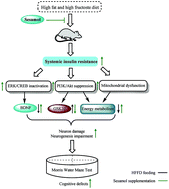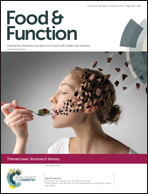Sesamol ameliorates high-fat and high-fructose induced cognitive defects via improving insulin signaling disruption in the central nervous system†
Abstract
Sesamol, a nutritional component from sesame, possesses antioxidant, lipid lowering and antidepressant activities. Nonetheless, few studies report its effects on high-energy-dense diet-induced cognitive loss. The present research aimed to elucidate the action of sesamol on high-fat and high-fructose (HFFD) “western”-diet-induced central nervous system insulin resistance and learning and memory impairment, and further determined the possible underlying mechanism. 3 month-old C57BL/6J mice were divided into 3 groups with/without sesamol in the drinking water (0.05%, w/v) and standard diet, HFFD, and HFFD with sesamol supplementation. Morris water maze tests demonstrated that sesamol improved HFFD-elicited learning and memory loss. Sesamol was also found to attenuate neuron damage in HFFD-fed mice. Importantly, sesamol treatment up-regulated brain insulin signaling by stimulating IRS-1/AKT as well as ERK/CREB/BDNF pathways; meanwhile it down-regulated neuronal death signaling GSK3β and JNK. Moreover, sesamol also normalized mRNA expressions of neurotrophins including BDNF and NT-3, as well as expressions of mitochondrial metabolic and biogenesis related genes Sirt1 and PGC1α. Consistently, sesamol also reversed high-glucose-induced oxidized cellular status, mitochondrial membrane potential loss, insulin signaling inhibition and cell death in SH-SY5Y neuronal cells. Taken together, the current study proved that sesamol reduced western-diet-induced cognitive defects in a mouse model by inhibiting insulin resistance, normalizing mitochondrial function and cell redox status, and improving IRS/AKT cell surviving and energy metabolism regulating signaling. This compelling evidence indicated that sesamol is a potential nutritional supplement to prevent unhealthy-diet-induced learning and memory loss.



 Please wait while we load your content...
Please wait while we load your content...